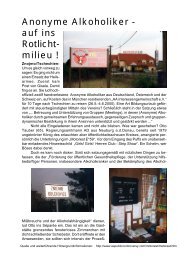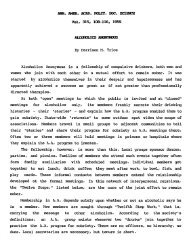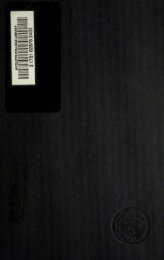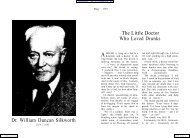or uncaring forces which I cannot control, and the horror I feel when I contemplatemy own death. <strong>The</strong>re is the anxiety <strong>of</strong> guilt and condemnation: the awareness thatI can never be perfect (at an absolute level) in meeting all <strong>of</strong> the demands which lifewill place on me, and that I will always be guilty <strong>of</strong> not having been good enough,along with the closely associated anxiety <strong>of</strong> rejection and abandonment. Each period<strong>of</strong> human history tends to have its own dominant form <strong>of</strong> existential anxiety,which overshadows the others in importance for a century or so. Images <strong>of</strong> theanxiety <strong>of</strong> emptiness and meaninglessness filled many <strong>of</strong> the artistic, literary, anddramatic expressions <strong>of</strong> the twentieth century: one can see it appearing in the apparentlymeaningless drips <strong>of</strong> color which made up the paintings <strong>of</strong> Jackson Pollockduring the 1940’s, in Albert Camus’ formative novel <strong>The</strong> Myth <strong>of</strong> Sisyphus, and in theworks <strong>of</strong> the playwrights who were associated (in the 1940’s, 50’s, and 60’s) withthe theater <strong>of</strong> the absurd—Samuel Beckett, Eugene Ionesco, Jean Genet, HaroldPinter, Tom Stoppard, Friedrich Dürrenmatt, Edward Albee, and so on.Being sickened by my own inner rottennessWhen he attended the Oxford Group house party, and felt God powerfully atwork in that gathering (what the twelve step program calls the spirit <strong>of</strong> the tables),Leon discovered that there was no way <strong>of</strong> becoming conscious <strong>of</strong> God without alsobecoming conscious <strong>of</strong> self. And the rottenness he discovered within himself madehim sick to his stomach and nauseated. He started to become aware <strong>of</strong> all the falsityand phoniness which had made up his life. He found that all <strong>of</strong> the things he hadhad preying on his conscience (things which he had spent years trying to suppressand forget and alibi and explain away) were coming up to the surface <strong>of</strong> his mindonce again: acts <strong>of</strong> selfishness, cowardice, and dishonesty. He found himself tryingto project these feelings <strong>of</strong> self-loathing over onto the Oxford Group people whowere so disturbing him: they were the ones who were phonies, they were the ones whowere bossy and opinionated know-it-all’s, they were the ones who were out to trickhim out <strong>of</strong> something or other. [chapter 1, section I]Recovering alcoholics who can remember things like driving an automobiledrunk and running into other people and hideously injuring those other peopleand having to stand there uninjured (with police handcuffs on) and listen to thoseinjured people scream with pain can understand exactly why Leon said that it wasa feeling <strong>of</strong> nausea which we felt when we confronted our true selves. Drug addictsand gambling addicts who think too hard about how their addiction caused them tocast away their spouses and children, find their insides cramping up within them, inthe same kind <strong>of</strong> total visceral disgust with themselves.8
I must embrace my own feeling <strong>of</strong> soul-sicknessIf I wish to engage in positive spiritual growth after having had this experience,Leon says, “what happens to me comes about step by step.” (We can compare thisto Bill W.’s insistence that spiritual growth occurs in a series <strong>of</strong> discrete steps.) Godis all powerful, but will not work on me until I give him my consent. My first act <strong>of</strong>consent must come with a willingness to feel this self-sickness instead <strong>of</strong> runningaway from it. I must identify each piece <strong>of</strong> selfishness or cowardice or dishonestywithin me, and then let God change me and heal me. [chapter 1, section I]<strong>The</strong> Cross: surrender and acceptanceFrank Buchman had the experience which gave birth to the Oxford Group whenhe went to the Keswick Convention in the Lake District up in the north <strong>of</strong> Englandin 1908, and attended a small chapel service where Jessie Penn-Lewis 7 preached onthe Cross <strong>of</strong> Christ. In an overwhelming religious experience, Buchman suddenlyrealized the necessity <strong>of</strong> surrendering all his earthly resentments and making restitution(or “making amends” as the twelve step people call it) to those at whom heheld those resentments.Philip Leon talks again and again in this book about accepting the Cross <strong>of</strong>Christ, but those who find this language objectionable should note how he makesthe rather startling statement here that readers who want to test his theories aboutthe centrality <strong>of</strong> the cross, can begin if they choose by regarding “the whole account<strong>of</strong> the life, the divinity and crucifixion <strong>of</strong> Jesus as a fairy tale invented and used bymany people through many ages in order to illustrate what they meant by God’spower in relation to the world as it is.” But like all good myths and fables, they needto note that this one has an important moral: “God, it teaches us, is that powerwhich changes degradation into glory, death into life, defeat into triumph, inertiainto inexhaustible activity.” [chapter 1, section I] And Leon believes that once I seethe transforming effect <strong>of</strong> this power on my own life, I will begin to realize that I amdealing with something which (at some essential level) is not a fairy tale, but totallyreal.Part <strong>of</strong> me aches and longs for God’s healing and energizing love, while anotherpart—the selfish part—resists God with all its might, because that part <strong>of</strong> me fearschange, creativity, and anything involving real effort on my part. [chapter 1, sectionI] This is the part which must be crucified, or “crossed out” if you are someone whoobjects to too much heavily Christian language. I must practice what the twelve stepprogram calls surrender and acceptance—that is, in traditional Christian terms, Imust crucify all these selfish fears—or I will never find the new divine life whichemerges on the other side <strong>of</strong> the crucifixion.9
- Page 1 and 2: The Philosophyof Courageor The Oxfo
- Page 3 and 4: fear of being creative and being ou
- Page 5 and 6: truly were. There was also a spirit
- Page 7: Comparison with Bill W. and A.A.on
- Page 11 and 12: Alcoholism and addiction asforms of
- Page 13 and 14: specifications as to how that is to
- Page 15 and 16: perfect serenity. By shutting off a
- Page 17 and 18: The act of total surrender allows t
- Page 19 and 20: this. But you do not have to be any
- Page 21 and 22: NOTES ON CHAPTER 3. SHARING OR SPRE
- Page 23 and 24: [chapter 3, section II]If I am succ
- Page 25 and 26: NOTES ON CHAPTER 4. CHANGING SOCIET
- Page 27 and 28: The Oxford Group and Alcoholics Ano
- Page 29 and 30: view Press, 2000) 28. “Sick origi
- Page 31 and 32: INTRODUCTIONThe world is going mad,
- Page 33 and 34: TRUE RELIGIONWhy are you cowards, p
- Page 35 and 36: CONTENTSIntroductionTrue Religion31
- Page 37 and 38: to do the same for the term “pixi
- Page 39 and 40: the power which is God or from God.
- Page 41 and 42: God. The reader who is asked to con
- Page 43 and 44: these qualities and on the relation
- Page 45 and 46: y the power of God. But it is not n
- Page 47 and 48: IIMYSELFI AM NOT GODThe objection l
- Page 49 and 50: DISEASE OR FEAR: MANIAWhat is wrong
- Page 51 and 52: impurity which is denoted by the si
- Page 53 and 54: occasions when he is threatened wit
- Page 55 and 56: IIIHEALTH OR PASSIONPURE DESIRESinc
- Page 57 and 58: PASSION AND PARTICULAR DESIRESNot b
- Page 59 and 60:
Chapter 2DEMONSTRATION BY EXPERIMEN
- Page 61 and 62:
to desire passionately to be health
- Page 63 and 64:
Conformity with the commandment aga
- Page 65 and 66:
IITHE CRUCIAL EXPERIMENT ORTHE QUIE
- Page 67 and 68:
and hypocrisy, that judged by absol
- Page 69 and 70:
not meant; that the fool was not as
- Page 71 and 72:
hands I commit my spirit.”With th
- Page 73 and 74:
that God the Highwayman is really a
- Page 75 and 76:
I obey guidance to go and see a man
- Page 77 and 78:
foreseen or seen as I have represen
- Page 79 and 80:
AN ILLUSTRATIONBecause the checking
- Page 81 and 82:
IVTHE QUITE TIME AND THEH WORKING D
- Page 83 and 84:
NEED FOR AN ADEQUATE PSYCHOLOGY OF
- Page 85 and 86:
only to poets. But to judge from on
- Page 87 and 88:
For the first time passion or the r
- Page 89 and 90:
HEAVENWhat I have come to is Heaven
- Page 91 and 92:
For Heaven is now no longer a dream
- Page 93 and 94:
I am contiguous with other selves i
- Page 95 and 96:
expanses of self, seem to be experi
- Page 97 and 98:
IITHE STRATEGY OF THE LARGER SELFGO
- Page 99 and 100:
FEAR CONCEALS FEARNow the procedure
- Page 101 and 102:
exposure of the “universe.” Tru
- Page 103 and 104:
IIITHE STRATEGY AGAINST THE LARGER
- Page 105 and 106:
his own. The miracle of self-consci
- Page 107 and 108:
usiness, for government, for the na
- Page 109 and 110:
and then make him follow its course
- Page 111 and 112:
importance to the Company. However,
- Page 113 and 114:
of smugness, self-satisfaction and
- Page 115 and 116:
PREOCCUPATION WITH SYMPTOMSWhen “
- Page 117 and 118:
channel through which collective gu
- Page 119 and 120:
abyss and the area coincide. It is
- Page 121 and 122:
IVTHE ECONOMIC PROBLEMTHE ECONOMIC
- Page 123 and 124:
that need or greed, and not the cap
- Page 125 and 126:
VPOLITICAL SCIENCEUNCHANGED POLITIC
- Page 127 and 128:
it, by blaming other people instead
- Page 129 and 130:
VIPHILOSOPHY AND ARTTHE SINS OF THE
- Page 131 and 132:
For expression or projection is the
- Page 133 and 134:
DENYING THE SEPARATION BETWEEN THE
- Page 135 and 136:
which the errors are designed to pr
- Page 137 and 138:
A PERSONAL NOTEThe philosophy given
- Page 139 and 140:
the formation of sacred stereotypes















